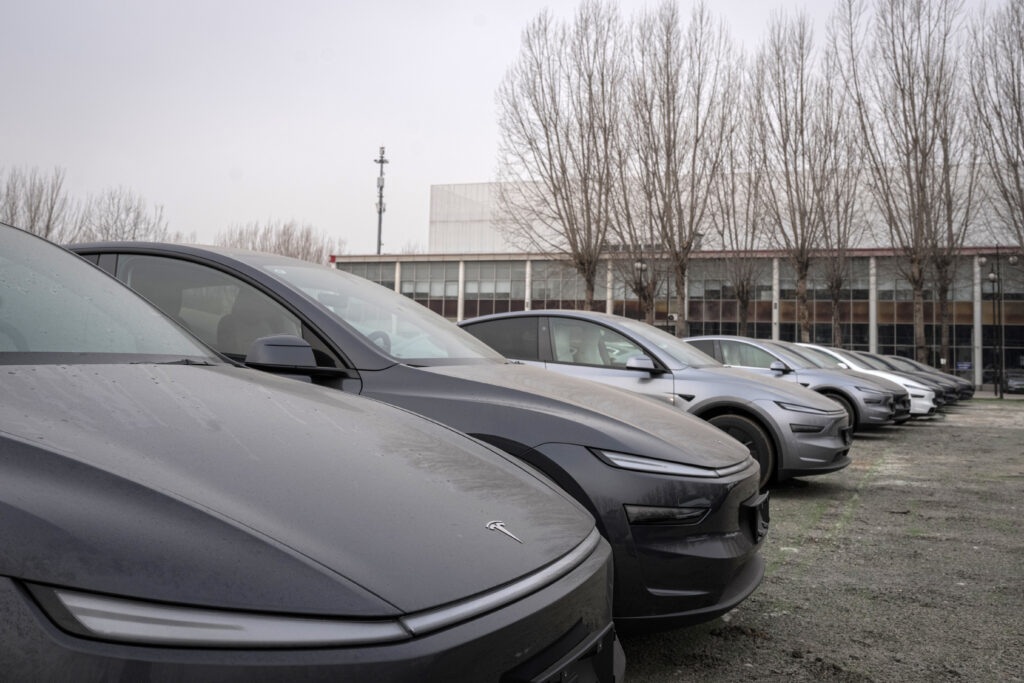
Tesla’s activities in China seem to be experiencing a downturn, indicating that its peak success in the world’s largest electric vehicle market may be diminishing.
Data from China’s Passenger Car Association shows that Elon Musk’s automotive enterprise has faced a decline in China for five consecutive months compared to the previous year. Shipments plummeted by 49% in February, amounting to just 30,688 vehicles — the lowest monthly total since July 2022, when only 28,217 EVs were shipped amid the height of the Covid pandemic.
ADVERTISEMENT
CONTINUE READING BELOW

Recently, Tesla’s Shanghai facility has been undergoing adjustments to its production lines for improved efficiency and to reintroduce the sought-after Model Y, which accounts for the dip in output and the recovery time needed. However, the downward trend was already evident prior to these modifications.

The graph displays the market share of the top 12 car manufacturers in China, accounting for all vehicle types — electric, hybrid, or traditional. Tesla ranks at No. 11, representing less than 5% of the market. Moreover, the trend lines for most global carmakers are trending downward instead of upward.
Enter BYD Co. After ceasing production of fully internal combustion-engine vehicles in March 2022, BYD’s market share is nearing 15%. Last month, the company sold over 318,000 fully electric and hybrid passenger cars, reflecting an astonishing 161% year-on-year increase. Additionally, BYD set a new record for international sales, totaling 67,025 units.
This achievement is a significant contributor to Tesla’s challenges.
Read: Tesla sales fall 45% in Europe while Musk engages in controversial politics
Tesla’s sales are markedly decreasing in other regions — for example, a 76% drop in Germany to just 1,429 cars last month, even as overall EV registrations have surged. In China, disappointing shipments can be largely attributed to a limited and outdated product lineup, especially when compared to contemporary and more appealing choices from BYD and other manufacturers.
Data from the end of last year indicated that Tesla’s share of domestic sales was at 2.6%, its lowest in 12 months, according to the China Automotive Technology and Research Center.
Morgan Stanley remarked earlier this month that it anticipates Tesla’s presence in China “will continue to decline systematically.” While China accounted for 21% of Tesla’s total revenue in 2024, analysts predict this figure will drop to approximately 6% to 7% by 2030.
Another chart illustrates how BYD has encroached on Tesla’s traditional market segment.

Both the Model Y and Model 3, the two vehicles manufactured in Shanghai, have seen price reductions, although they still average around $33,500.
In contrast, BYD’s best-selling model this year in China, a sporty hatchback called the Song Plus, has seen price cuts ranging from 8% to 18%, depending on specifications. The most expensive Song Plus EV is approximately $21,000, a significantly lower price point compared to Tesla vehicles.
ADVERTISEMENT:
CONTINUE READING BELOW
Additionally, BYD’s popular model, the Seagull, which has attracted around 82,435 customers this year, is priced at an average of just $9,900.
Chinese automakers have also made great strides in enhancing their offerings with localized software tailored for domestic driving conditions.
Earlier this year, BYD announced that it would make advanced driver-assistance features available to a broader audience by integrating its God’s Eye technology into even its most affordable models. Consequently, features such as lane-keeping and adaptive cruise control are now accessible not only to those affording high-end vehicles.

A BYD Seagull at the Shanghai Auto Show in 2023. Image: Bloomberg
Geely Automobile Holdings Ltd., currently the fourth-largest carmaker in China by market share, announced last week that it would roll out its AI-powered pilot system across all its brands, including Galaxy, Zeekr, and Lynk. This G-Pilot technology will enable vehicles to autonomously navigate highways and park themselves.
Tesla is not standing still. In addition to the eagerly awaited refresh of the Model Y — now sporting a slim LED light spanning its front, reminiscent of the Cybertruck — the company activated driver-assistance features in China last month that are comparable to its Full Self-Driving (FSD) capabilities available in the USA. These features will be accessible for customers opting to pay 64,000 yuan ($8,800), an amount that nearly matches the cost of an entire vehicle from BYD.
For Tesla, re-evaluating its pricing strategies for both its driver-assistance features and vehicles is essential.
Implementing tiered FSD packages or a subscription model, akin to what is available in the US, could make its EVs more appealing. Chinese consumers greatly value intelligent software features in their vehicles, presenting Tesla with an opportunity amid the waning public interest in Musk.
Tesla might also consider increasing its use of locally sourced components and leveraging China’s robust supply chain, ensuring that it is not just manufacturing electrically powered vehicles but also integrating advanced technology.
BYD has a keen understanding of the local market dynamics. A major challenge for the company will be whether it can effectively replicate its successes in key automotive markets outside of China, particularly with potential tariff complications. It will require significant investment and time to solidify its brand on the international stage.
© 2025 Bloomberg
Follow Moneyweb’s extensive finance and business news on WhatsApp here.






